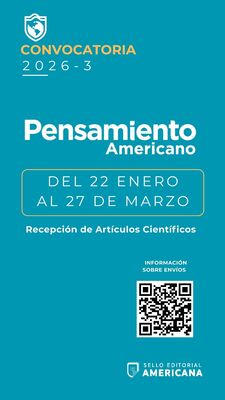Caracterização do pensamento matemático avançado através do estudo do princípio dopombo-correio
DOI:
https://doi.org/10.21803/penamer.17.35.794Palavras-chave:
Caracterização, Didática da matemática, Ensino superiorResumo
Introdução: A formação de professores tem assumido especial relevância, dada a constante necessidade de conectar a aprendizagem com os contextos das novas gerações, ainda mais com o boom dos avanços tecnológicos, em que a matemática desempenha um papel fundamental. Diante dessa situação, surge uma pergunta: Que conhecimentos matemáticos devem ser ensinados na escola? Objetivo: Identificar a necessidade de fortalecer a formação de professores de matemática, reforçando as conexões inversas entre a matemática avançada e a matemática escolar, como um elemento que permitirá um melhor desenvolvimento de
atividades voltadas para o desenvolvimento do pensamento matemático dos alunos. Com base nas abordagens de Tall (1991), e fazendo uso da estratégia de resolução de problemas proposta por Mason et al. (2010). Metodologia: Este trabalho tem uma abordagem qualitativa, enquadrando a experiência de ensino, com base na resolução de problemas
não rotineiros relacionados com o princípio do pombal. Resultados: Caracterização do pensamento matemático avançado (AMT) em alunos dos últimos semestres de um curso de licenciatura em matemática, mostrando dificuldades na interpretação de problemas e conjecturas, destacando o uso de elementos geométricos como base para demonstrações.
Downloads
Referências
Burton, L. (1994). Clashing Epistemologies of Mathematics Education: can we see the ‘wood’for the ‘trees'?. Curriculum Studies, 2(2), 203-219.
Briars, D. J., Larson, M., Strutchens, M. E., & Barnes, D. (2015). A Call for Mathematics Education Colleagues and Stakeholders to Collaboratively Engage with NCTM: In Response to Martin's Commentary. Journal of Urban Mathematics Education, 8(2).
Cai, J., &. Lester, F.K (2016). Can Mathematical Problem Solving Be Taught? Preliminary Answers from 30 Years of Research.
Camargo, L. (2021). Estrategias cualitativas de investigación en educación matemática. Universidad de Antioquia, 202 – 224.
Dewey, J. (1916). Democracy and education. The Macmillan Company, 1916. http://140.211.62.101/dewey/contents.html
Dreyfus, T (1991). Advanced mathematical thinking processes. Advanced mathematical thinking.
Dubinsky Ed, (1991). Advanced Mathematical Thinking and the Computer, in Tall D. O. (ed.), Advanced Mathematical Thinking, Kluwer: Holland, 231-248.
Felmer, E. (1 de agosto de 2016). Felmer: “la resolución de problemas debe estar en el corazón de las clases de matemáticas”. Centro de investigación avanzada en educación. https://www.ciae.uchile.cl/index.php?page=view_noticias&id=872&langSite=es#:~:text=La%20resoluci%C3%B3n%20de%20problemas%20deber%C3%ADa,de%20observaci%C3%B3n%2C%20inducci%C3%B3n%20y%20deducci%C3%B3n.
González, C. (2016) Principio del palomar. Estímulo del talento matemático (2015-2016). Universidad Politécnica de Madrid. Recuperado el 18 abril de 2024 https://matematicas.uam.es/~eugenio.hernandez/Estalmat-Materiales/CarlosGonzalez/2015-10-24-CG-Principio%20del%20Palomar.pdf
Gamboa, G.D., Badillo, E., & Ribeiro, M. (2015). El horizonte matemático en el conocimiento para la enseñanza del profesor: geometría y medida en educación primaria. PNA. Revista de Investigación en Didáctica de la Matemática.
Guacaneme-Suárez. EA, Obando-Zapata. G & Garzón, D. (2017). Colombia: Mathematics education and the preparation of teachers. Consolidating a professional and scientific field. Mathematics Teacher Preparation in Central America. Springer.
Hernández-Sampieri, R. & Mendoza, C (2018). Metodología de la investigación. Las rutas cuantitativa, cualitativa y mixta, Ciudad de México, México: Editorial Mc Graw Hill Education.
Jiménez, R. et. al. (s.f.). Análisis descriptivo de la solución de un problema matemático. Monografías. https://www.monografias.com/trabajos101/analisis-descriptivo-solucion-problema-matematico/analisis-descriptivo-solucion-problema-matematico
Losada, M. (2001). Olimpiadas de Matemáticas: Retos, Logros (y Frustraciones).
Losada, M. (2023). Notas de clases Seminario Pensamiento Matemático. Doctorado en Educación Matemático. Bogotá. Inédito.
Mason, J., Burton, L. & Stacey, K. Thinking Mathematically. Pearson, 210 – 248.
Polya, G. (1970). How to solve it. Editorial Trillas.
Schoenfeld, A. (1992). Learning to think mathematically: problem solving, metacognition, and sense-making in Mathematics. Handbook for Research on Mathematics Teaching and Learning (D. Grouws, Ed.). p. 334-370.
Solorzano J. (2023). Una reflexión sobre la pertinencia del pensamiento matemático avanzado en la formación de los profesores de matemáticas y su relevancia en la práctica docente. III Simposio de Matemática y Educación Matemática, el XII Congreso Internacional de Matemática asistida por Computador y el III Simposio de Competiciones Matemáticas Volumen 10, No. 2 - MEM2023 ISSN: 2346-3724.
Tall, D. (1991). Advanced Mathematical Thinking. Kluwer: Holland, 3-21.
Wasserman, N. (2021). Abstract Algebra for Algebra Teaching: Influencing School Mathematics Instruction. Journal of Mathematical Behavior.
Zazkis, Rina. (2018). Advanced mathematical knowledge: how is it used in teaching? Cerme 6 Proceding. Simon Fraser University, Canada Roza Leikin, University of Haifa, Israel.
Downloads
Publicado
Edição
Seção
Licença
Copyright (c) 2024 Pensamiento Americano

Este trabalho está licenciado sob uma licença Creative Commons Attribution-NonCommercial-NoDerivatives 4.0 International License.
The author or authors of an article accepted for publication in the Journal Pensamiento Americano will transfer all of the patrimonial rights to the American University Corporation free of charge, within which are included: the right to edit, publish, reproduce and distribute both print media as digital, in addition to include in article in international indexes and / or databases, likewise, the Editorial Seal is authorized to use the images, tables and / or any graphic material presented in the article for the design of covers or posters from the same magazine. By assuming the patrimonial rights of the article, it may not be partially or totally reproduced in any printed or digital media without its express permission.
AUTHORITY ASPECTS
For the Pensamiento Americano Journal, all the authors of an article have made substantial contributions to the research and the manuscript, and they share the responsibility when the article presents errors, fraud in some way or violations of copyright.
After submitting an article, the journal does not accept the addition, deletion or change in the order of the authors, in addition we reserve the right to release the article when it has been submitted to the journal and under no circumstances will American Thought accept the article. withdrawal of an article during any phase of the editorial process





